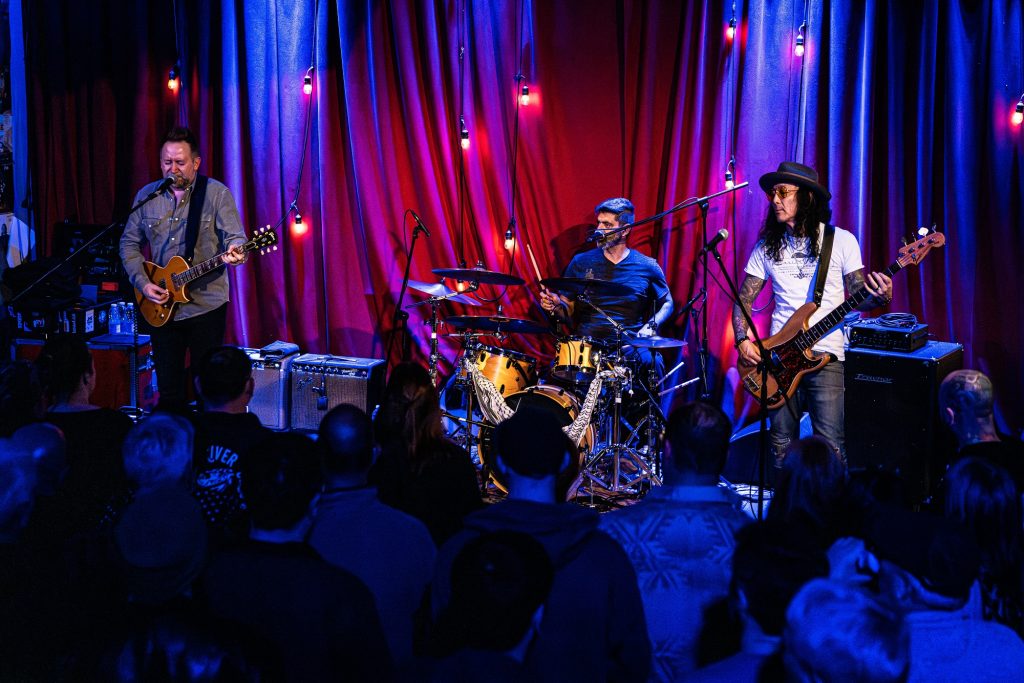
An interview with Wide Mouth Mason (and some concert photos, too)
[Ross MacDonald was on the job again in Ottawa. – AC]\
Once again Neat Coffee Shop in Eastern Ontario, 40 minutes west of Ottawa, is bringing in rock bands that aren’t expected in a small rural town. This time, western Canada’s alt-rockers Wide Mouth Mason brought their ‘Made In Canada Tour’ for two sold-out shows.
Many bands will start with deeper cuts, or new music at a concert. Not so with Wide Mouth Mason, they came out strong with one of their big hits from ‘97, ‘Why’. Great choice, the audience were instantly on their side singing along, holding drinks in the air, and recording the experience on their phones.
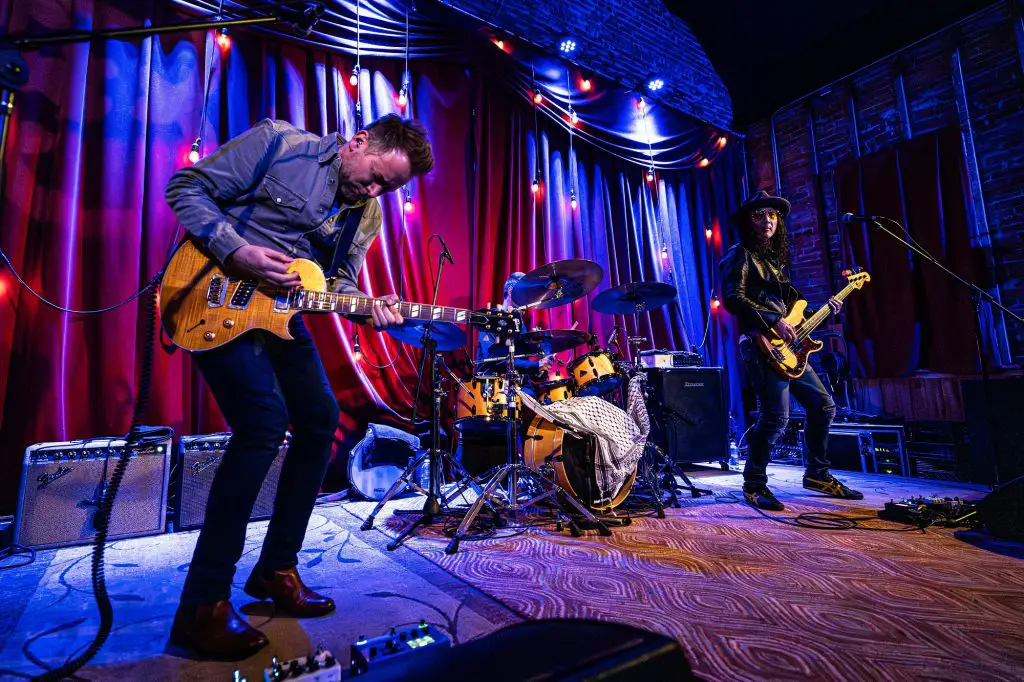
Their second song was ‘This Mourning’, and for someone going to a Wide Mouth Mason concert, and not overly familiar with their discography, they will be catching themselves many times through the show and saying to themselves: “did they do this song? It isn’t a cover is it?” No, these are all originals, they have a huge depth of singles that they recorded over their almost 30 years in the business.
And with such a large music catalogue, their setlist is always changing. Lead singer Shaun Verrault stated “we just added this song [‘Tom Robinson’] to the setlist for the first time in 20 years.”
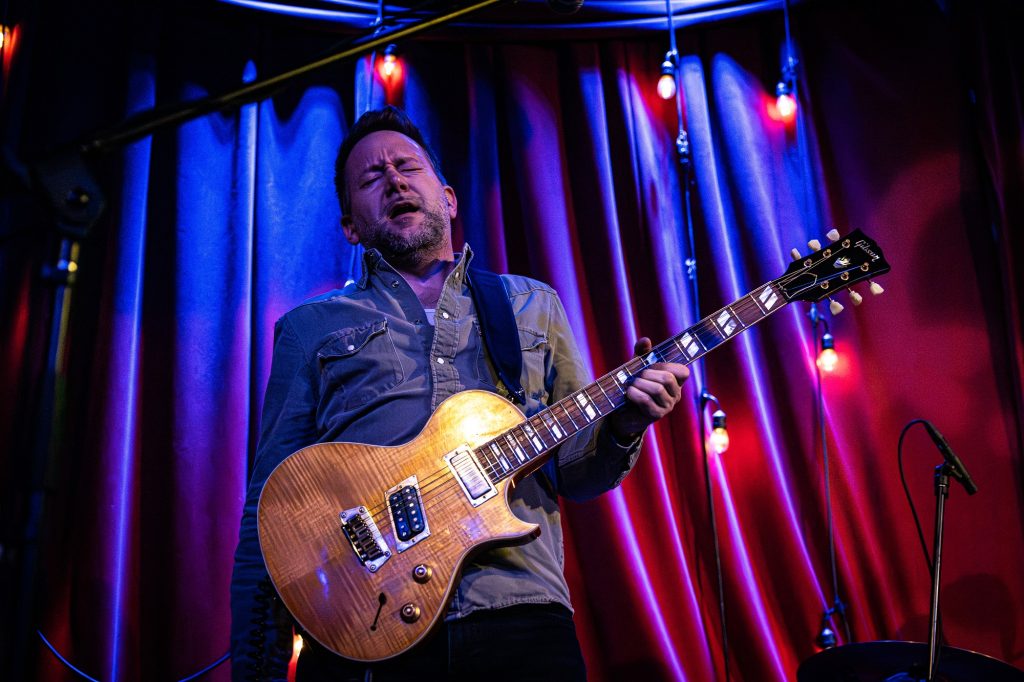
Although it is a small stage at Neat, Shaun and bassist Reed Shimozawa made the most of it; it’s amazing to see musicians bouncing around while not missing a note. And Shaun was giving a lesson in blues guitar, there were no frets left on his Gibson Nighthawk as he played the full length of the neck during ‘Sister Sally’.
“I don’t mean to brag, but that’s my oldest friend Safwan on drums.” added Shaun just before breaking into one of their biggest hits ‘Smile’. It was a ferocious performance. Shaun has beautiful vocals, but Safwan adds depth on the backing vocals and some nice subtle harmonies.
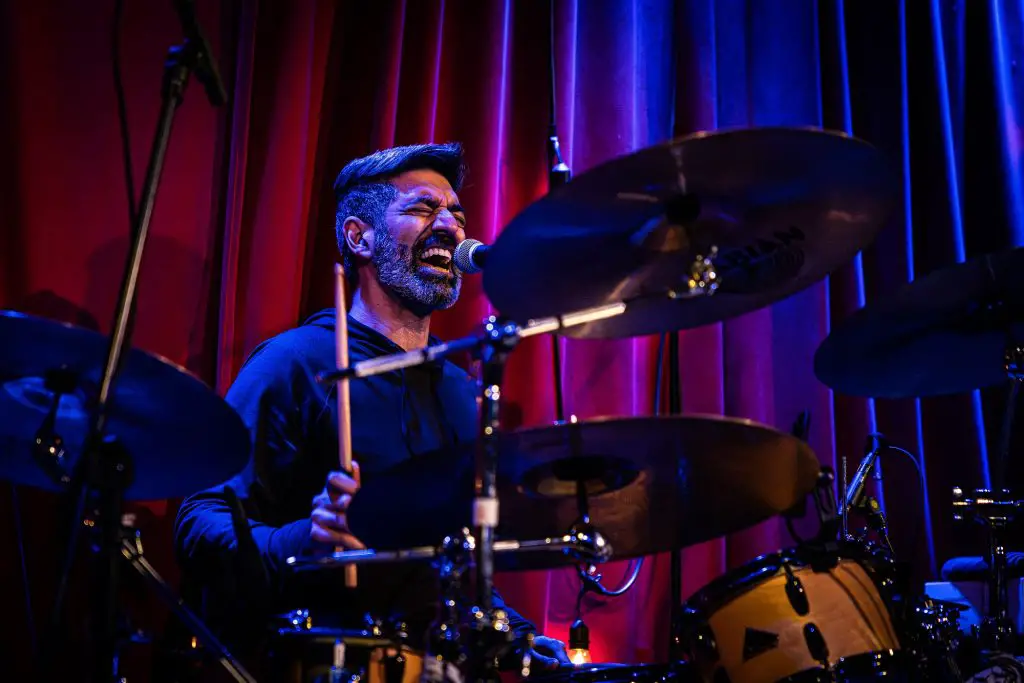
After ‘Smile’ it was time to slow things down a little. Shaun said: “this is a song that I wrote while performing on the holiday train across Canada.” ‘Long Distance Love’ is a beautiful song where the band had some reverb on mic, copo’d up to the second fret, and Safwan dropped a beat like a train heading down the tracks.
Next Shaun put down his Strat and pulled out his lap steel guitar. If the audience was expecting a country song from the lap steel, they were so very wrong. Shaun has innovated a new method to playing a lap steel that he calls the tri-slide. Instead of one slide, Shaun puts three slides on his left hand, “like C-3PO’s hand”. It allows him more precision and can push the notes in different directions. They then banged out some of their hardest rock songs from their latest record ‘You Pushed Me’. After an epic solo during ‘Only Child’ Shaun proclaimed “No tariffs, just riffs!!” to the delight of everyone.
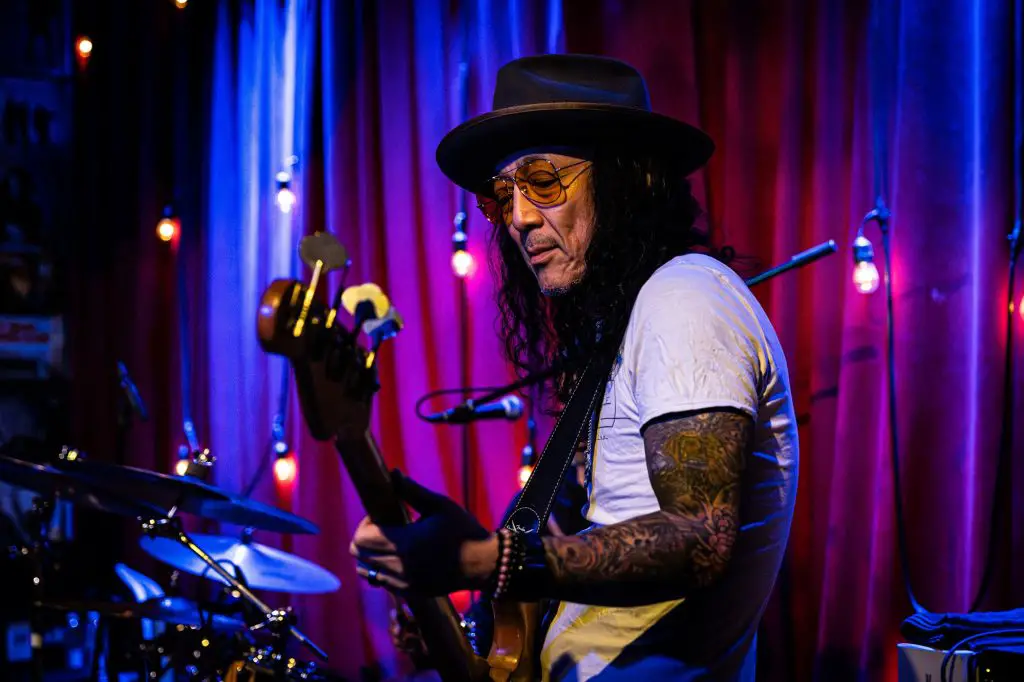
Most often a lap steel is layered with other guitars. However, Shaun’s tri slide technique adds a fullness not typically heard; this is perfect for live performances.
At one point Shaun spoke with the audience: “This song we have never played live before” and as Shaun continued to introduce the song, “imagine you had a friend and you got along and everything was going well, then one day things changed, and you don’t know why, but you got a ‘Raw Deal’.” Everyone knew what Shaun was alluding to…
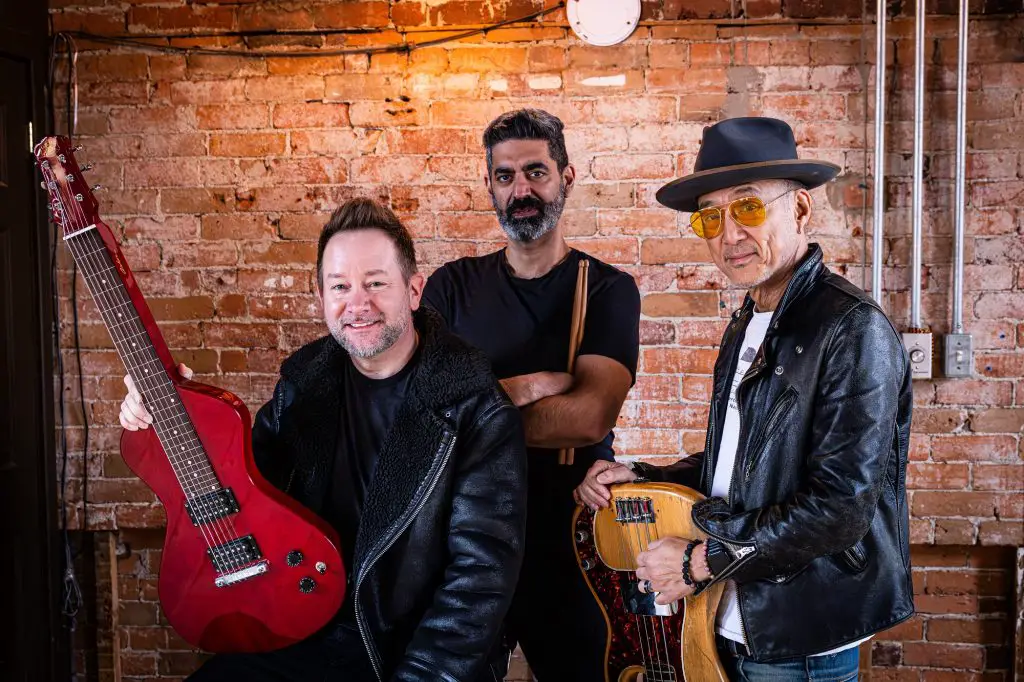
Wide Mouth Mason’s live show isn’t over-choreographed or over-rehearsed, it has originality and flow that seems drawn from the audience. Shaun is leading not only with his well-defined vocals, but he is laying down precise and complex riffs on guitar, while the drums and bass provide an intricate groove. Everyone can hear that there is definitely a blues inspiration in their songs.
When the band played ‘Sugarcane’, they did a mash-up with a verse of the Rolling Stones’ ‘You Can’t Always Get What You Want’ fused into the middle. After the song Shaun said “that part was from the British band that we had close for us five times.”
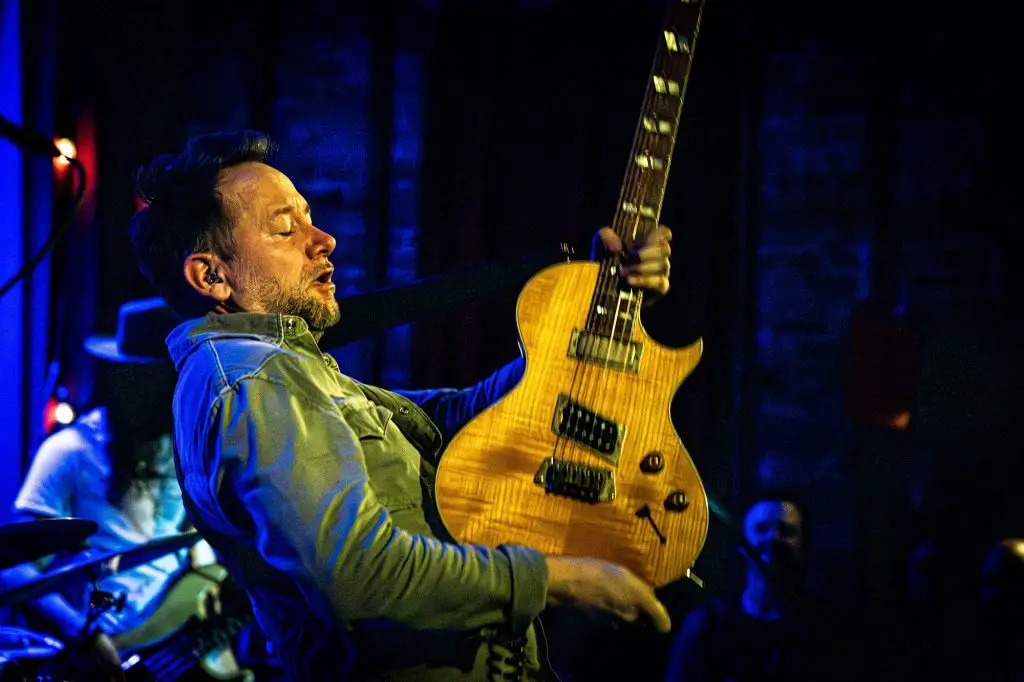
There is no room for bands to sneak “backstage” at Neat. So Wide Mouth Mason just said that this is where they end their main set and would come back for the “encore”. The finale was a trip back again to their original album with ‘Mary Mary’. It was one last chance to hear the band’s prowess with a great jam-out that nobody wanted to end. It was a hot finish to a night where there was a winter storm outside to cool things off.
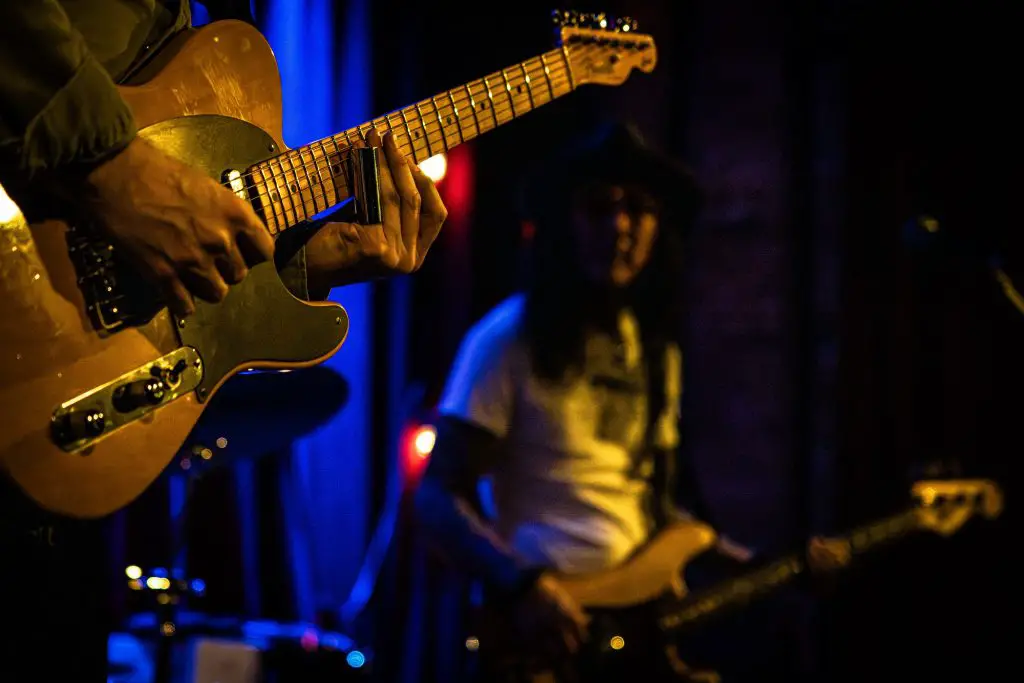
After the show, A Journal Of Musical sat down with Shaun Verrault, Safwan Javed, and Reed Shimozawa of Wide Mouth Mason to catch up with the last few years, and find out what’s ahead.
AJOMT: In a couple of your older videos, Safwan, you always have a lollipop in your mouth. Like ‘Smile’ and ‘Change’. Was that a thing?
Safwan: It was a thing that a director was like, you know what, let’s make a thing for you. And then the result of that thing became people would start bringing me lollipops, like buckets of them, to gigs. I’m like, I’m going to lose teeth on this, I think I need to undo that thing. Maybe you can bring me toothpaste or something. A thing for a moment until I was like, this is not a good thing. ZZ Top has beards. That guy from Limp Bizkit had the makeup thing, and Saf had the lollipops.
AJOMT: Shaun, your first pro gig was in Yellowknife?
Shaun: It was baptism by fire, it was during the Giant Mine strike, it was intense. That was a good introduction to the time on stage is the time on stage, but all the rest of the time you’re going to see some interesting things.
AJOMT: Reed, you’ve got a great history in alt-rock too, Zuckerbaby.
Reed: Zuckerbaby was my band around the same time that these guys came out. Out West also. It was actually the name of a movie that we were in Blockbuster and saw it: Zuckerbaby. I don’t know what that means, but it seems like it would be a good name for a band.
Shaun: It just means sugar baby. Good to know what it is before you get a tattoo of it.
AJOMT: Shaun, did you learn guitar with formal lessons?
Shaun: Yeah, I did start at 10 years old taking lessons. There was a school for parents who weren’t sure if their kids were really going to commit to it, where they would provide a guitar for the first eight weeks. And I really enjoyed it. A great advantage to taking lessons at that school was that all the teachers were working musicians. So for three weeks it might be an Eric Johnson, really technical sort of shredder guy, and then a jazz guy, and then a country person. So I had a real mix of teachers that I got to take lessons from. And probably did it for maybe seven or eight years. A lot of formative years were pre-tab being available, pre-YouTube, having to listen to a record and figure out what they’re doing by ear and by chance, and by your small vocabulary slowly growing. So yeah, I was a student of it.
Saf and I were both in jazz band where I was playing trumpet and guitar eventually. So we had theoretical musical awareness from that. But a lot of it was just getting exposed to certain records and trying to figure out how they did stuff.
AJOMT: Were you playing drums at that time [Safwan]?
Safwan: Yeah, I think we were kind of lucky. We just had band programs where there’s a teacher who’s kind of a champion of really being committed to having kids engage with music in a meaningful and long-lasting way. It started for us in grade five, I think, we had both concert band and jazz band. And we both went to the same elementary school, and we both went to the same high school. And again, that same kind of tradition of a very strong music program continued there with both concert and jazz band. Music in schools, it’s an important thing.
AJOMT: Other guitarists have noted that they are often noodling on the guitar and recording what piques their interest. Shaun, do you do that same sort of thing?
Shaun: Yeah, every day, for the same way someone might have a yoga practice or something, I’ll just sit down and empty the day out of my fingers on a guitar, or a lap steel, or a banjo, or a mandolin, or something, and always have my phone handy, and I’m filling it; there’s an Apple Note called ‘Spew’, whenever I get an idea, that’s where it goes. And the ones that stick get translated by hand into a book that I have. I’ll take two pages and write what I have as an idea at the top left, and then just flip through and be like: oh yeah, I got an idea for that one, ran out of steam on that, all right, what’s another page? Read that, that makes me think of this… So the phone is always close by, and I’m constantly filling it with ideas and stuff.
AJOMT: Safwan, were drums always your passion?
Safwan: Yeah, when I was quite young, my family never rented movies or anything like that, So it was always through other friends that I’d get exposed to things. I had a friend that his dad would take me and him to the cinema, and we’d watch movies in theaters. And I saw a Beatles movie, I can’t remember which one it was, but there’s a scene in it where they’re tearing down their gear or setting it up, and someone touches a boom stand for a cymbal, and one of the guys is like, Oh, you don’t touch Ringo’s stuff. Ringo doesn’t want you touching his stuff. And for some reason, I’m like, that’s cool! I think I was like seven or something like that, and I was like, I want to be a guy who doesn’t want anyone touching my drums. This is my thing.
And then I just begged my parents for a couple of years. Can I please, I want to play drums. And they got me a toy drum set first. And then when they saw I was kind of into it, I started taking lessons. I don’t know if the guy teaching me was just kind of saying it to keep the lessons going, but I think he said something positive. “Yeah, there’s something there.” And then they were like, Okay, let’s get you a drum set. (9:40) So I got a real drum set.
Shaun: But then you got the Neil Peart Rush kit and accessories. Did the guy retire?
Safwan: So I bought my first kit, it was a used kit. And then the second one was also a used kit. But for some reason, I think, my dad, who didn’t know anything about music, said, “Okay, well, I think that means you need more drums.” Not like a better quality. I don’t know where he found it, but he found some guy who used to be like the drummer for, a Caribbean band or something like that. And the guy was getting rid of his stuff, and I think it was like a 10 piece drum set. And then so much percussion with it as well, like wood blocks and a bell set and all kinds of shakers. Everything you can think of, including rototoms and everything. I don’t even know what I’m supposed to do with this, but man, it looks cool. It filled up my parents’ basement. I miss that kit, Tama Superstar.
Shaun: You should bring that back.
Safwan: It’s gone. I don’t know what happened to it. 10 piece Tama Superstar, rosewood colour. The Neil Peart kit.
Shaun: And to his parents credit, I played with other drummers before where it’s: you practice at the drummer’s house and they’d be like, okay, you have from 3:00 to 3:45 that you can go full volume. But when we went to Saf’s place, it was not only play for as long as you want, it was when you’re ready, come up and we’ve made snacks and we’ve made drinks for you. And wow, you guys sound great. They were so supportive of us, which is crazy.
Safwan: To this day, I think if I told my mom, hey, we need to rehearse, she’d be so excited about us coming to rehearse at her place. Shewas really into it. My dad didn’t fully comprehend until two things happened. One, when we started getting airplay on CBC because he only listened to CBC, or any mention of us. And then the second thing was when he started having friends and colleagues be like, hey, do you think you get your son to sign a thing for me? And he’d be like, oh, I guess this is a thing.
AJOMT: I don’t hear that you are a big hitter, like a Dave Grohl. I hear a lot of Stewart Copeland in you. Was he an influence?
Safwan: He was a huge influence on me. And I think it wasn’t super-conscious. I’ve actually had a few friends and other people say that that’s the person that I most seem to remind them of for drummers. And I think probably it was that we covered a lot of Police songs early on in our cover band days. I think something about it just really resonated with me. I think because they had a lot of reggae influence. I was really into reggae for a long time. But it was also a hybrid of it. And I think that’s kind of where subconsciously I wanted to land.
Shaun: I think so often the drummer can completely change the character. Like Mitch Mitchell in the Hendrix experience jazz drummer hitting the way he did. It sounded totally different when Hendrix was with any other drummer. And the other thing I think Saf brings is that there are things I call “Saf beats”. A drummer who solely listened to Western music growing up and didn’t listen to quality musicians and people playing tablas and stuff think of rhythm, I think, differently than the way Saff is formed by it.
So lots of beats he comes up with, I couldn’t think of. Like ‘Companion’ or ‘My Old Self’ or songs like that, that’s just a “Saf beat”. So it’s more than just the syncopations and stuff like that.
Safwan: I think you having said that to me over the years is what made me think, oh yeah, I guess it would have because through most of my early childhood, the only music that would play in my house was South Asian music. And it was almost always either a type called Qawwali or another type called Ghazals. And that was it. Every Saturday morning, every Sunday morning, that’s the only music I would hear as a child. So it did something. And I got into it, too. As we got going, as I got more musically aware, I did deep dives on both of those styles specifically.
AJOMT: You have had a pretty close relationship with Gordie Johnson [of Big Sugar ] over the years.
Shaun: Yeah, he had produced our 2000 record, ‘Stew’. And no one has heard our band play more times than him because we and Big Sugar have played so many tours together, literally hundreds of shows. So when Earl [Pereira, bass player] originally left the band, we had just gotten added to a tour opening for ZZ Top and had no bass player. So, I originally called Gordie just going, look, you work with a lot of musicians, who would not only fit in our band, but also is a good hang. There’s an hour on stage and 23 hours together, sometimes not in great conditions, you’re tired, you’re dealing with adversity, you’re on the road. So, not only who is a musical fit, but who’s a good hang and who’s funny when they’re tired instead of just short tempered. And he was like, “I’d love to do it. My first instrument was bass. Would I like to go on the road with ZZ Top for a month? Yeah! But also, I think I get what the bass chair in your band is.” And he became the bassist.
And then after a while, he started needing to focus on his other projects. And every show that we would do ended up being a Big Sugar and Wide Mouth Mason show for a couple of years because we were each in each other’s bands. :
And Reed’s been our guy for the last, has it been three years?
Reed: The first show I did was pre-COVID. But then there was a few shows that Darren played and a few shows that other people played. When was it like full time? Well, pretty much after COVID.
AJOMT: Shaun, I heard that your first public musical experience had a connection with Suzie Vinnick.
Shaun: Yes, at Buds on Broadway which for decades had a jam on Saturday, that is all ages. And it’s been an accelerator for us in Saskatoon, (25:35) for Jordan Cook, who plays as Reignwolf now, for Kyle Riabko, who’s on Broadway, like a bunch of us. Usually the headliner would do an opening set of the jam. So that might be Jack Semple, who’s like the Danny Gatton of Canada, or Big Dave McLean or someone like that. So you would just sit there and soak it up, learning lessons every second of watching the set, and then get to go play. So yeah, Suzie very generously, when she saw me walk in and go, oh, this is way above my head, stopped me and went, “you brought a guitar? Do you sing? No? Well, do you want to get up and play the blues with me after this?” And I did, and that was what got me up in front of people for the first time playing.
AJOMT: It sounds like there is a Canadian west-coast connection where people like Ryan Dahle [of Age of Electric and Limblifter] and Craig Northey [of The Odds] seem to be everywhere.
Shaun: Well, Ryan Dahle has been producing now especially, but he’s been playing and stuff, not just Age of Electric and Limblifter, but filling in. Our last two records that we made, ‘Late Night Walking’ and ‘I Wanna Go With You’, we made with Ryan. On ‘Late Night Walking’, Ryan recently moved to Mayne Island, where he has a log compound with a studio in it, in the woods, in the mountains. We had been on the same circuit as Age of Electric and Limblifter and run across them, but at a Vancouver studio we re-connected and became good friends. He was the one who introduced us to Reed. We asked Ryan originally because he played a couple of the bass parts on ‘I Wanna Go With You’.
Safwan: He does a lot of the background vocals on both of those albums. He is so skilled at so many different things, that he is perfect to play the producer role because he sees it all, he sees the whole picture. He is almost a little frenetic and mad-scientist “what if we do this!”
He is not only a really good friend, we have so much respect for him and admiration. His knowledge and skill is fantastic. It’s why Reed is with us.
AJOMT: The start of 2025 started as a shit-show for you Shaun, was this ‘Made In Canada Tour’ planned beforehand, or after your parents passed away? Is this tour a form of therapy for you?
Shaun: The tour was planned beforehand. There is this run, and then we have pockets of shows from now until the fall [2025]. In the space of one month both of my parents died. It was not an “I’ll follow you into the dark”. They hadn’t been together for decades, and it was an unfortunate coincidence. Knowing that we had a bunch of shows coming up, I was looking forward to being able to pour all of that experience into what I do. And there is so much room for improvisation, I have been expressing that through playing. I get to not only whisper, and scream, and jump around, I can hold a note so long that it starts to get fuzzy. I get to do a bunch of cathartic physical things, but then a bunch of people cheer for it afterwards. So it’s been a therapeutic experience.
Safwan: You knew it would be. We were talking while all this was going down. Invariably the conversations would be: “I can’t wait to be back out on the road because that’s where this is going to be so much of a release.”
Shaun: And yeah, be with my brothers for support.
AJOMT: A huge thank-you to Shaun, Safwan, and Reed for taking the time and opening their lives to us.



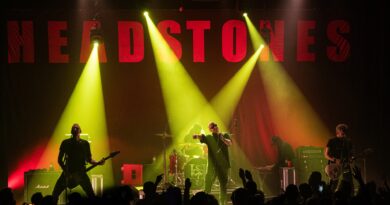
*Verreault